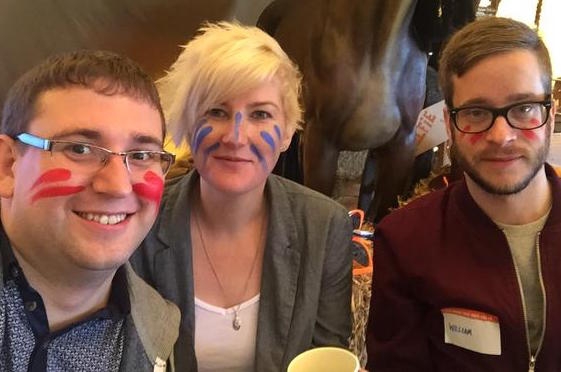
Paraplanners apply war paint for Powwow 2015

Tribes of Paraplanners descended on the rolling green hills of Northamptonshire this morning for the third national Paraplanners' Powwow.
Richard Allum CFPCM, the 'unconference' event’s founder, welcomed the 90-plus guests who have travelled from all parts of the country to attend the event which mixes informality and attendees' choosing agendas with technical seminars and knowledge sharing.
War paint was applied by many, a Powwow tradition, as Paraplanners split up into blue, red and green tribes before taking part in various sessions with topics chosen by them.
How Paraplanners can improve their report writing was one of the first sessions of the day.
Among the topics discussed were insistent clients, capacity for loss, pensions, attitude to risk, and length of reports. Delegates were also asked if they used executive summaries.
Paraplanners were asked how many pages their reports run to typically. Many said 10 to 20 or above with only a few saying they are under ten.
Kim, from The Paraplanners, said reports are ritually 40 pages or more and end up being ‘waffle’ a lot of the time. She said clients’ interest is lost after 7 pages or so.
Clients say they want a sheet of A4 with bullet points and outlining costs, what they should do and why, she said.
One Powwower raised the topic of different expectations from the regulatory bodies and said: “FOS and the FCA are in two different streets and don’t talk to each other. They don’t live in the same street, the FCA say one thing but the FOS is driving the suitability report.”
He said he can’t see this changing and added that there were issues with compliance.
He said: “Compliance in networks are paranoid to the point of being ridiculous. Who are we writing the letter to? The FCA or FOS? We need some clarity.”
{desktop}{/desktop}{mobile}{/mobile}
For better record keeping and to aid with compliance, the suggestion was raised to record adviser meetings with clients.
However, one delegate cautioned how this might sit with PI insurers. He said although it might seem like a great idea, it was important to ask first what does the compliance network think about it and added there must be an exact process to it. A problem could be potentially having to keep the recording on file permanently, he warned.
Others said it must surely only benefit clients by having a better record of their meeting that will help them.
Powwowers were asked if there should be formal training? Many suggested they were self taught when it came to report writing.
This led onto the debate on who should provide formal training for Paraplanning, with the conversation moving onto the fact there is no minimum standard to say someone is a Paraplanner.
While there will always be standards, it is hard to formally to create this across the whole Paraplanning sphere, one said.
Delegates were asked whether having a more defined qualifications route would bring more people into the sector, one delegate asked, suggesting they might be more likely to be aware of it as a result of this.
Paraplanners all do the job very differently and even Paraplanners themselves can’t necessarily define it, one said.
Paraplanners were also asked whether they have total control over their report templates. Only a few said yes.
Further sessions on day-to-day top tips for Paraplanning and improving spreadsheet skills for Excel ninjas have also been taking place.
